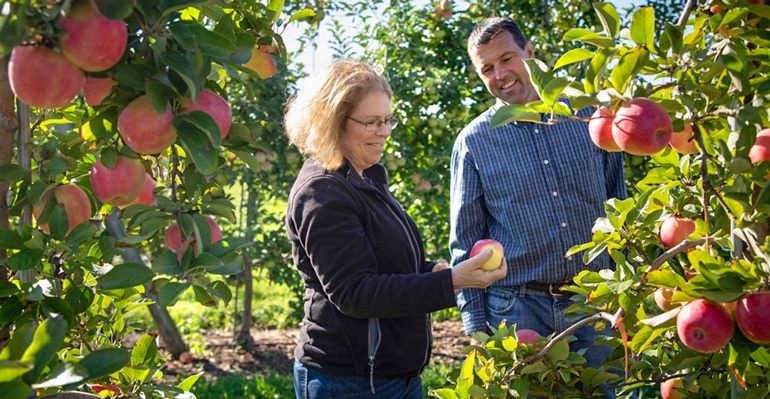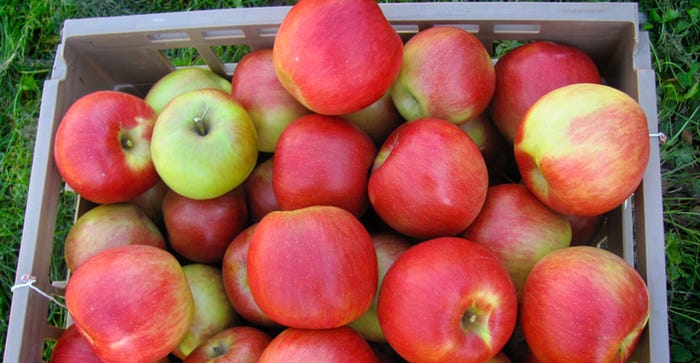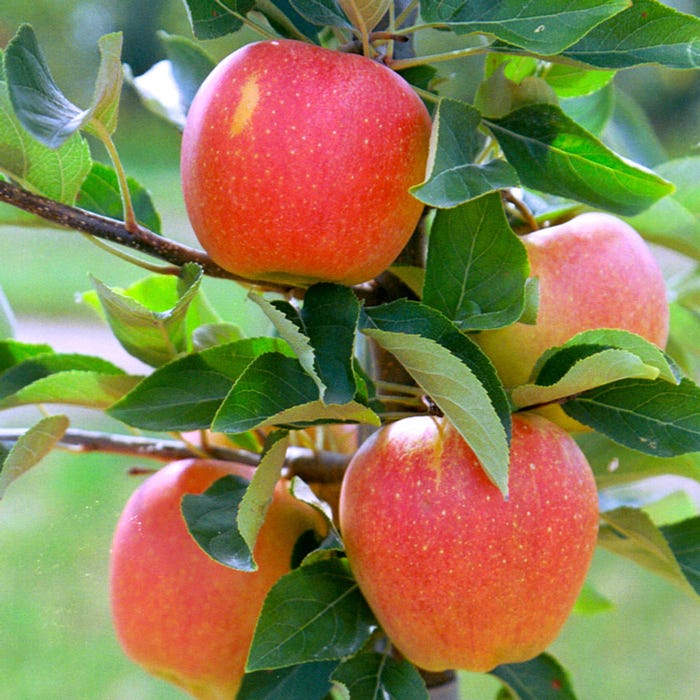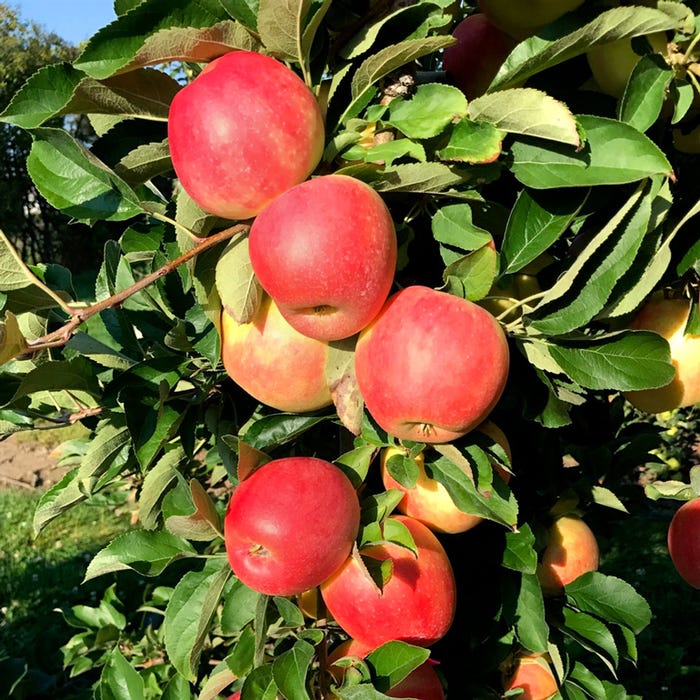September 24, 2020

Three new apple varieties are now available from Cornell University, which houses the oldest apple breeding program in the country.
Susan Brown, professor of agriculture and life science at Cornell, and research specialist Kevin Maloney announced the release of NY56, NY73 and NY109 — marketed as Cordera, Pink Luster and Firecracker, respectively.
As an open-release, orchards in New York state and across the U.S. will be able to grow the new varieties without licensing exclusivity.
With Cordera, Brown accomplished a challenging task: breeding an apple that retains both its flavor and texture while also staying scab resistant. Apple scab is a fungal disease that reduces fruit yield and quality and poses a major threat for New England growers because it’s common in wet springs.
In addition to test plots in orchards across New York state, Wegmans has also been testing Cordera in Canandaigua, N.Y., for five years.
“Having access to the varieties that Susan Brown and Cornell are working on allows us to look into the future in way that will hopefully expose our customers to new and unique food experiences,” says Mark Bowker, orchard crop expert at Wegmans Organic Farm. “For us, disease resistance makes the performance of NY 56 stand out in our orchard. Of course, it always comes down to flavor, and we think it has that too.”
Spanish for “lamb,” Cordera was named after Brown’s predecessor, Robert Lamb, and his family. Lamb, who died in 1997, was an apple breeder at Cornell from 1948-88, and met his wife, Barbara, at Cornell AgriTech, formerly the New York State Agricultural Experiment Station. Their daughter, Betsy Lamb, is an ornamentals coordinator at Cornell’s New York State Integrated Pest Management program.
 CHALLENGING APPLE: Not only does Cordera have good flavor and texture, it’s also scab resistant, something that posed a challenge to the researchers when developing the variety.
CHALLENGING APPLE: Not only does Cordera have good flavor and texture, it’s also scab resistant, something that posed a challenge to the researchers when developing the variety.

“Bob would have been thrilled to know this apple variety was named after him and our family,” Barbara Lamb says. “He was passionate about breeding apples and would be thrilled at how successful the apple breeding program is today at AgriTech.”
Brown spent 23 years working with the best attributes of Honeycrisp and Gala apples to perfect Pink Luster. Its bright pink-red skin, crisp texture and juiciness make this new variety shine. Pink Luster also matures in mid-September, which makes it well-suited for on-farm sales and you-pick operations.
“NY73 has generated substantial interest at our orchard given how pleasingly different it is from the routine common list of apples,” says John Halsey, owner of the Milk Pail in Southampton, N.Y. “Some of the visitor comments we have heard are that it has beautiful color, medium to large size making it fun and easy to pick, wonderful mild tart flavor, and very smooth enjoyable skin texture.”
Firecracker is being dubbed a “triple threat” as it is one of the few varieties that works well for eating, baking and hard cider production.
 TRIPLE THREAT: Firecracker is being dubbed a “triple threat” as it is one of the few varieties that works well for eating, baking and hard cider production.
TRIPLE THREAT: Firecracker is being dubbed a “triple threat” as it is one of the few varieties that works well for eating, baking and hard cider production.

“Firecracker has a partial russet skin and it has a unique combination of acidity and sweetness that produces really complex and evolving flavors,” Brown says. “It’s ideal for anyone who wants to go on a culinary adventure.”
With the addition of Cordera, Pink Luster and Firecracker, CALS will have released more than 69 apple varieties since 1880. The most recent varieties from Brown’s breeding program, SnapDragon and RubyFrost, have been highly successful with growers across the state and are also exported to markets in Canada, Israel and Asia.
“Research and thorough testing are crucial in making a really good apple, but that takes a whole team,” Brown says. “Research specialist Kevin Maloney, the Cornell AgriTech field crew, researchers at Cornell AgriTech and the School of Integrative Plant Science, Cornell Cooperative Extension, and the New York apple industry all deserve credit in collaborating to help deliver varieties that support the apple industry.”
 PINK BEAUTY: Susan Brown spent 23 years working with the best attributes of Honeycrisp and Gala to perfect Pink Luster, a variety that has bright pink-red skin, a crisp texture and juiciness. It also matures in mid-September, making it a solid choice for you-pick operations.
PINK BEAUTY: Susan Brown spent 23 years working with the best attributes of Honeycrisp and Gala to perfect Pink Luster, a variety that has bright pink-red skin, a crisp texture and juiciness. It also matures in mid-September, making it a solid choice for you-pick operations.

Those interested in obtaining a license for the new varieties should contact Jessica Stein, senior licensing and business development officer at Cornell Technology and Licensing, at 607-255-0270 or [email protected]. Additional questions can also be directed to Susan Brown at [email protected].
Rodger is the senior manager of marketing and communication at Cornell AgriTech.
Source: Cornell AgriTech, which is solely responsible for the information provided and is wholly owned by the source. Informa Business Media and all its subsidiaries are not responsible for any of the content contained in this information asset.
Read more about:
ApplesYou May Also Like




